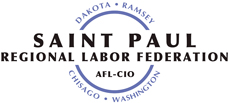Efforts to halt the spread of COVID-19 are creating immediate economic hardship for many working families.
The Saint Paul Regional Labor Federation’s nonprofit organization, the Saint Paul Labor Studies and Resource Center (LSRC), has compiled the following list of resources that may be available to help people make ends meet during the public-health crisis.
This is an evolving list, as some agencies have suspended operations to protect their employees, volunteers and clients from the outbreak. The list will be updated as our AFL-CIO Community Services liaisons learn more.
Unemployment Insurance can provide immediate, emergency relief for many workers impacted by COVID-19, including people who have been laid off or who have seen their hours reduced. Gov. Tim Walz moved quickly to streamline UI benefits during the crisis, while federal lawmakers created a new program called Pandemic Emergency Unemployment Compensation, providing 13 weeks of extended unemployment benefits for certain workers.
- Learn more about expanded access to Unemployment Insurance benefits during the COVID-19 response.
- The best way to apply for Unemployment Insurance benefits is online. Applications are accepted Sunday through Friday, from 6 a.m. to 8 p.m.
- The federal CARES Act provides an additional $600 in unemployment compensation to eligible workers, and makes benefits available to self-employed people, independent contractors and others who are not typically eligible. The National Employment Law Project has produced a helpful fact sheet on who qualifies.
People who lost their employer-sponsored health insurance during the COVID-19 outbreak can shop for coverage on the state’s health exchange, MNsure.org.
Greater Twin Cities United Way is a longstanding partner in the AFL-CIO Community Services program, and the nonprofit is stepping up to help working families during the COVID-19 response in several ways.
- United Way’s 211 hotline is staffed 24 hours each day by specialists ready to answer people’s questions and connect them to local resources. Just dial 211, or text the letters MNCOVID to 898-211.
- Click here to learn more about what Greater Twin Cities United Way and its 95 nonprofit partners are doing to assist the pandemic response.
- Greater Twin Cities United Way has launched the Twin Cities COVID-19 Response and Recovery Fund dedicated to ensuring access to food, shelter, child care, sanitary supplies and financial assistance. To contribute, text GTCUWCOVID19 to 51555.
Evictions have been suspended during the COVID-19 pandemic, but resources remain are available to working people concerned about keeping their homes.
- HOME Line provides free legal assistance to qualified renters. For assistance, call 612-728-5767 or click here to email an attorney.
- The Minnesota Homeownership Center helps people buy and stay in their homes. Find a list of COVID-19 housing resources on its website. For assistance, call 651-659-9336 or click here to send an email.
- Find more information about housing supports during the COVID-19 response on Minnesota Housing’s website.
Financial assistance may be available through your county. Call to arrange an intake interview.
- In Ramsey County, call 651-266-4444.
- In Hennepin County, call 844-803-8466.
- Click here for information about applying for benefits in Chisago County.
- In Dakota County, call 651-554-5611.
- In Washington County, call 651-430-6459.
Xcel Energy has announced it will not disconnect any household’s utilities during the pandemic. Learn more about the company’s response here.
Some schools are giving students free meals while schools are closed due to the COVID-19 virus.
- Click here for information on the Saint Paul Public Schools’ meal program, or check with your local school district for more information.
- Hunger Impact Partners is helping Minnesota families secure meals for children. Click here for more information.
- Second Harvest Heartland suggests calling ahead before visiting your local food shelf during the pandemic. Find a map showing resources near you.
The deadline for filing state and federal income taxes has been pushed back to July 15, 2020. Meanwhile, the CARES Act provides direct “Economic Impact Payments” – or stimulus checks – for most working Americans. Track yours at irs.gov/coronavirus.
Student loan borrowers may be able to suspend payments during the pandemic response. Click here for more information.
The American Red Cross has a “critical need” for blood donors right now. To schedule an appointment call 651-291-6789, or click here to find a drive.
Be on the lookout for scams! Here’s a list of tips from the Federal Trade Commission on how to avoid scams related to the coronavirus.
Stay healthy! The Minnesota Department of Health offers best practices for staying healthy, whether you’re staying home during the pandemic or going to work. (And remember, if your employer tries to prevent you from taking the steps necessary to protect your health, alert your union immediately!)
Talk to someone if you’re experiencing mental distress. Free emergency assistance is available around the clock by texting the letters MN to 741 741. Reach the Minnesota chapter of the National Alliance on Mental Illness (NAMI) at 1-888-NAMI-Helps, or the Minnesota Association for Children’s Mental Health at 1-800-528-4511 for help navigating the mental health system, support or additional resources.

